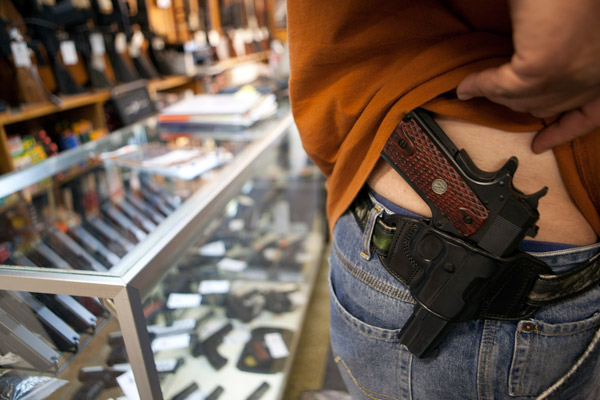
Photo: David Pierini/Chicago Tribune
Last year seventh-circuit court judge Richard Posner told Illinois it had to allow concealed carry, and that it had six months to figure it out. Six months is a blink of an eye by Illinois state legislative standards, so the deadline is coming up soon. (When I wrote about this issue awhile ago, we were afraid that the legislature would beat us to the punch, which, LOL.) It could be appealed to the Supreme Court, but all AG Lisa Madigan has done so far is ask for a month to decide if she wants to appeal; the June 9 deadline still holds.
And right now the bill getting most of the attention is HB 183, proposed by Chicago rep Kwame Raoul. By the standards of concealed carry, it's strict but not unusually strict.
Here's what it would do:
* Prohibit concealed carry in lots of public places: courthouses, K-12 schools, child care facilities, casinos, amusement parks, sports arenas, hospitals, libraries, polling places, on-premise (liquor) consumption retailers, and a handful of other, typical places. The list is pretty comprehensive but not unusual, and doesn't specifiy colleges, who are allowed but not required to ban concealed handguns. The only thing that's somewhat unusual is a ban on public transportation, which is there for obvious reasons.
This is significant because one of the objections is that it would create a "patchwork" of gun-free zones:
State Sen. Kwame Raoul, D-Chicago, told The Associated Press earlier this week he plans to propose concealed-carry legislation that would give home-rule communities, including Bloomington and Normal, the power to create gun-free zones in addition to any created by state law.
Interim Bloomington Police Chief R.T. Finney said he agrees with making schools or universities gun-free, but it’s important to have consistency across the state. Otherwise, “if you’re traveling through, you don’t know if you’re violating or not,” he said.
But in practice, Raoul's bill covers most of the places where concealed weapons are typically banned. The exceptions are colleges and private businesses, which could ban concealed weapons at their discretion. These are also pretty common options on the concealed-carry menu, and under Raoul's legislation they'd have to post a sign. Someone carrying a weapon would have to stow it in his vehicle to get in, but carrying in the public way is okay.
* The "may issue" aspect of the law has been weakened:
Sen. Kwame Raoul said Friday he’ll remove one of the more contentious provisions in his concealed-carry legislation that required permit applicants to show they have “good moral character” before qualifying to carry a weapon in public.
[snip]
Opponents have cited the “good moral character” provision as too vague and a way local law enforcement could veto anyone’s application.
It's pretty vague, but in practice the regularity with which moral character provisions are used to veto applications depends on the state. In Hawaii it's very strict, limited to "exceptional circumstances." In California, another may-issue state, it's all over the place:
There is also gross inconsistency among authorities in California's 58 counties on what constitutes good cause, which could lead to courts finding equal protection violations, said Stephen Halbrook, a Virginia attorney and frequent litigator for the National Rifle Assn. In remote Plumas County, one in 39 adults has a carry permit, according to state Department of Justice statistics for 2011. In Los Angeles County, one in 33,700 adults is licensed to carry, and in San Francisco the latest records show zero civilian holders among the county's 700,000 adults.
So only a couple hundred people in L.A. County can carry. In New York City, it's about 37,000. Concealed-carry advocates hate that kind of inconsistency that may-issue allows, but Raoul pulled that provision.
* Still in Sen. Raoul's bill is the requirement that the applicant have a "proper reason" to carry a firearm, a provision borrowed from Indiana, where "proper reason" is "the defense of oneself or the state of Indiana." If a stink develops, it'll be over that.
* Nonetheless, there are moral-character provisions: applicants won't get a permit if they've been a respondent to a plenary order of protection, stalking, or no contact order; or "if the applicant has elected treatment under the supervision of a licensed program in accordance with the Alcoholism and Other Drug Abuse and Dependency Act or similar laws of any other state, within 5 years." Tennessee has similar provisions, but the date goes back ten years.
* You have to take eight hours of firearm training, and have to be able to shoot with 70 percent accuracy. This sort of provision is pretty typical; eight hours is less than Texas requires.
The home-rule aspect of Raoul's bill, which would allow municipalities to add their own gun-free zones to the list specified in the legislation, is still going to be an issue—but even if that gets pulled, there would still be a lengthy and fairly comprehensive (at least compared to other states) set of places where concealed carry would be illegal. Otherwise Raoul's bill is pretty moderate, suggesting that a compromise could be closer than it might look.


